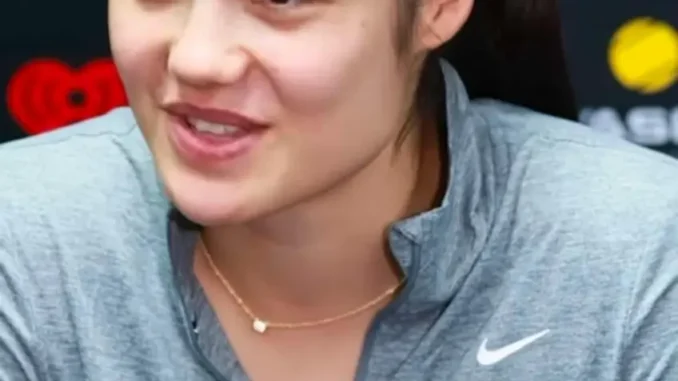
Emma Raducanu’s meteoric rise to stardom has made her one of the most talked-about athletes in tennis, but with that fame has come intense scrutiny. Since her historic US Open victory in 2021, Raducanu has faced a barrage of questions not just about her game, but about her demeanor, character, and approach to the sport. Among the most debated topics is whether the young British star carries herself with an air of arrogance, a perception fueled by her rapid ascent and the confidence she exudes. A former coach recently weighed in on this topic, offering insight into Raducanu’s personality and the challenges she faces as she navigates her burgeoning career.
From the outside, Raducanu’s demeanor can be interpreted in various ways. On one hand, she possesses a self-assurance that is essential for success at the highest levels of sport. On the other, her directness and poise may come across as aloof or overly self-confident to some observers. According to her former coach, much of this perception is rooted in misunderstanding rather than reality. He emphasized that Raducanu is far from arrogant; instead, she is intensely focused, driven, and highly aware of what it takes to compete against the world’s best players.
The coach explained that Raducanu’s confidence should not be mistaken for arrogance. As a young player breaking into the elite levels of the sport, she needed to develop a mindset that allowed her to believe she could beat more experienced and accomplished opponents. Her US Open triumph, achieved without dropping a set as a qualifier, was a testament to that mental fortitude. Confidence, the coach argued, is often misinterpreted when displayed by female athletes, who are frequently held to different standards than their male counterparts.
Raducanu’s journey to the top has been anything but conventional. Unlike many of her peers who climb the ranks gradually, Raducanu skyrocketed to fame almost overnight. The pressure that comes with such rapid success can be overwhelming, especially for a teenager. Her former coach noted that Raducanu’s ability to remain composed in the face of intense media scrutiny is often mistaken for arrogance, when in reality, it reflects her maturity and professionalism.
The coach also highlighted the cultural differences that may play a role in how Raducanu is perceived. Growing up in a multicultural household with Romanian and Chinese roots, Raducanu was raised with values that emphasize discipline, humility, and respect. These traits have shaped her approach to the sport and her interactions with others. However, in the competitive world of tennis, where players are often judged on their public personas as much as their performances, these qualities can be overlooked or misinterpreted.
Another factor contributing to the perception of arrogance is the media narrative surrounding Raducanu. Since her breakthrough, every aspect of her life—her endorsements, coaching changes, and even her fashion choices—has been dissected and analyzed. This relentless attention can create a distorted image, as fans and critics alike project their own expectations onto her. The coach pointed out that Raducanu’s reserved nature in certain situations is a defense mechanism rather than a sign of arrogance. In a world where her every word and action are scrutinized, she has learned to protect herself by maintaining a certain level of distance.
Raducanu’s handling of her coaching relationships has also been a focal point of criticism. She has worked with several coaches since her US Open victory, leading some to label her as difficult or demanding. However, her former coach argued that this narrative is unfair. As a young player still developing her game, Raducanu is in the process of figuring out what works best for her. The decision to change coaches is not a reflection of arrogance but a sign of her commitment to finding the right fit to achieve long-term success.
The coach also praised Raducanu’s work ethic and dedication, qualities that are often overshadowed by the scrutiny of her off-court life. Behind the scenes, she puts in countless hours of training and preparation, striving to improve her game and address the challenges she faces on the tour. Her willingness to adapt and learn demonstrates a level of humility that contradicts the accusations of arrogance.
Ultimately, the question of whether Raducanu is arrogant speaks more to the pressures and double standards faced by young female athletes than to her actual personality. As a rising star in a sport that places immense demands on its players, Raducanu is navigating a unique set of challenges. Her confidence, maturity, and ability to stay focused amidst the noise are qualities that should be celebrated rather than criticized.
The coach concluded by emphasizing that Raducanu is still at the beginning of her journey. At just 20 years old, she has already achieved more than many players do in a lifetime, but she is also still growing and learning. The labels and judgments placed upon her are not only premature but also indicative of the unrealistic expectations placed on young stars. As she continues to evolve, Raducanu has the potential to redefine what it means to be a confident and successful athlete in the modern era.
For fans and critics alike, the takeaway is clear: Emma Raducanu is not arrogant. She is a talented, ambitious, and resilient young woman navigating the complexities of professional tennis with grace and determination. The focus should not be on tearing her down with unfounded assumptions but on supporting her as she works to fulfill her immense potential. In the years to come, Raducanu’s journey will undoubtedly continue to inspire, and her former coach’s insights serve as a reminder to view her not through the lens of criticism, but with understanding and respect.
Leave a Reply